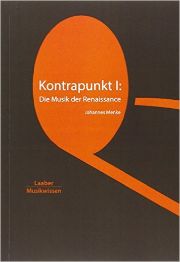Counterpoint recipes
A clearly structured textbook that is based on sources and makes you want to do your own experiments.

The monograph Counterpoint I: The music of the Renaissance by Johannes Menke is the second volume in the Fundamentals of Music series published by Laaber-Verlag. Menke is professor of historical composition theory at the Schola Cantorum in Basel and his publication is partly the result of work with his students. The book is not intended to be a treatise on the history of composition theory, but rather a textbook that aims to inform, inspire and provide orientation. The author achieves his goal with an inspiring style, an extremely systematic and well thought-out structure and, last but not least, a simple and comprehensible style. He consistently pursues a historical approach, skillfully incorporates (self-translated) source texts and, for example, does not shy away from including graphic or tabular representations from treatises in the introductory section "General Principles". In this way, the world of the Renaissance is impressively presented to the reader and at the same time, issues such as solmization, musica ficta or modality are explained in an understandable way. Modality in particular, with its three parallel coexisting systems in the 16th century (the classical eight modes, Glarean's twelve modes and the eight psalm tones), has sometimes been discussed in a confusing and confused manner.
For Menke, treatises are not so much law books as recipe books that point out possibilities and in which the various authors express their personal preferences. With such a relaxed attitude, which does not immediately focus energy on mistakes to be avoided, it is easy for the reader to begin their first composition exercises or at least to play some of the many illustrated music examples themselves. Menke begins quickly with relatively simple full-voiced examples (for example with cadences, so-called clausulae) so that there is no obstacle to full voicing. Although Counterpoint I: The music of the Renaissance is designed as a textbook and not as an actual workbook, it contains numerous suggestions and orientation aids for becoming active as a composer yourself. In this respect, Menke's book offers students, professional musicians and music lovers a profitable read and can also serve teachers with valuable illustrative material or as a reference work. The only minor drawbacks are a few erroneous double spaces or the few linguistic errors that would have been easily found if the text had been corrected.
In keeping with his concept, Menke also leaves the last word to the sources and quotes Gallus Dressler's recommendations to learners and teachers from his Praecepta musicae poëticae (1563).
Johannes Menke, Counterpoint I: The Music of the Renaissance, Grundlagen der Musik 2, 324 p., € 29.80, Laaber-Verlag, Laaber 2015, ISBN 978-3-89007-825-0








